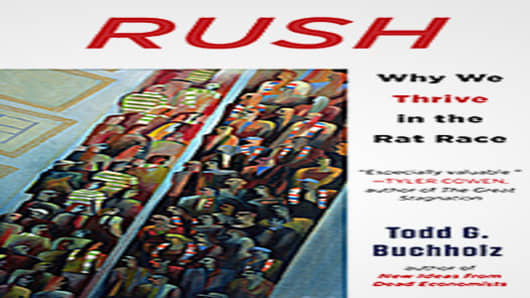GUEST AUTHOR BLOG: "Bring in da Noise, Bring in the Profit" by Todd G. Buchholz author of, "RUSH: Why We Thrive in the Rat Race."
Nobody ever started a tech company in a monastery.
Sure, the Trappist monks got into the beer racket, but they started in 1293 AD, years before Bill Gates saw Revenge of the Nerds.
Even if monks were willing to give up their hard cots to young men and women in Dockers, few startup-types would take advantage of their offer of free space, even if it came with WiFi.
Why?
Because monasteries, like old-fashioned law and accounting firms, are too quiet and stuffy.
Start-ups need buzz.
When I called together my partners for our new math game company called Sproglit, I asked, “Where should we meet?” Now, I have plenty of law firm friends who would have gladly lent us a spiffy conference room at their headquarters, complete with yellow pads and real stemware. But that would’ve been too dull. The obvious answer: Starbucks in Solana Beach, California. Why would we want to meet in a public place, just a few feet away from other hungry, ambitious inventors and businesspeople?
Neuroscience gives us a few reasons. Human brains are designed to take on new challenges in stimulating environments. Little surprises—something as simple as a free sample of a chocolate chip cookie — shake up our world, supercharge our dopamine levels and get us thinking with more energy, vigor and rigor.
As I point out in "RUSH: Why We Thrive in the Rat Race," the human brain’s frontal lobe encourages us to think and dream about the future. We are the animals that can conjure up tomorrow out of thin air. But we do our best thinking when we are in an atmosphere that tickles our imagination. A leather chair in a quiet oak office tends to make us sleepy, not dreamy with innovation.
That’s why newer office buildings have embraced more open architecture, where engineers and designers can bump into each other (even if they’re not clumsy). A study by Joan Meyers-Levy at the University of Minnesota showed that higher ceilings tend to spark creativity and abstract thinking. Low ceilings are good for robotically filling in annoying forms, like your 1040 tax return. The new headquarters for the Bill and Melinda Gates Foundation in Seattle features airy lounge areas that in an earlier era would show up only at a Four Seasons.
"We do our best thinking when we are in an atmosphere that tickles our imagination. A leather chair in a quiet oak office tends to make us sleepy, not dreamy with innovation."
Researchers at the Santa Fe Institute came up with the term “urban metabolism” to describe the quickened pace of activity and innovation that comes from more intense settings. Economist Richard Florida similarly argues that denser populations breed creativity. Look at it this way: let’s say Manhattan’s population (about 1.6 million) was evenly spread around a huge territory the size of Australia. Each New Yorker would have about 2 miles to himself. Spread so far apart, do you think they would still be world leaders in advertising, fashion, theater and finance? And besides, those delivery boys on bicycles would stop bothering to slide Chinese menus under each door.
Meeting at a busy coffee house has not only revved us up with buzz and caffeine, but it has helped us design Sproglit’s math games for iPads . Without fail, in the middle of our discussions, we’ve stopped to watch as some kid whips out an iPad, while his mom or dad jabbers with the barista about a double-soy, extra-foamy, half-caf latte. This is the kind of market research you can’t get behind closed doors while swiveling in a Herman Miller Aeron chair.
With all the energy and drive surrounding coffee bars, I think Howard Shultz should offer a special loyalty card that gives unlimited refills but is paid for with a sliver of equity instead of cash. President Obama is telling me “You didn’t build that.” I think Schultz deserves more credit than Obama for our success.
Of course, our Sproglit team moves beyond coffee now and then. We’ve tried El Torito, Fuddruckers, the Karl Strauss Brewery and many other names you won’t hear praised at the country club. That’s okay. We’re on the move and charged up by the rush.
Todd G. Buchholz is a former White House economic adviser and former managing director of the Tiger hedge fund. He’s the CEO of Sproglit, LLC and author of "RUSH: Why We Thrive in the Rat Race."
Email me at bullishonbooks@cnbc.com — And follow me on Twitter @BullishonBooks


